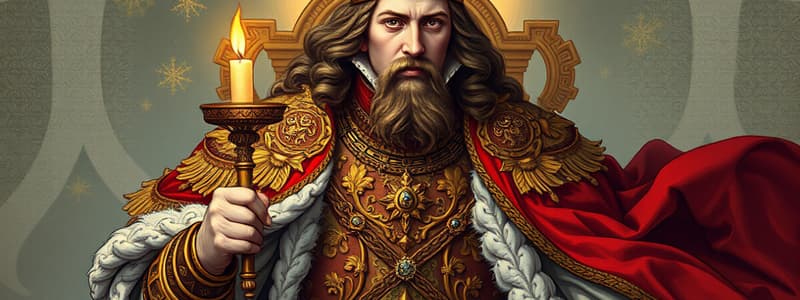Podcast
Questions and Answers
Charles X became king of France in?
Charles X became king of France in?
- 1830
- 1848
- 1824 (correct)
- 1812
What was a major difference between Charles X and Louis Philippe?
What was a major difference between Charles X and Louis Philippe?
- Louis Philippe was conservative.
- Louis Philippe was liberal. (correct)
- Louis Philippe was against reform.
- Louis Philippe believed in a monarchy.
Charles X sparked a revolt in France by?
Charles X sparked a revolt in France by?
- attempting to start a war with the rest of Europe.
- refusing to agree with the terms of the Congress of Vienna.
- trying to increase the power of the monarchy. (correct)
- favoring the interests of business owners over the wealthy.
What was the outcome of most European revolts of the 1830s?
What was the outcome of most European revolts of the 1830s?
The term balance of power means?
The term balance of power means?
A main reason that the Age of Revolutions initially failed to achieve widespread change in some nations of Europe was because?
A main reason that the Age of Revolutions initially failed to achieve widespread change in some nations of Europe was because?
Which statement reflects the view of French conservatives after the Congress of Vienna?
Which statement reflects the view of French conservatives after the Congress of Vienna?
What was a main difference between French conservatives and liberals following the Congress of Vienna?
What was a main difference between French conservatives and liberals following the Congress of Vienna?
The Congress of Vienna led to revolts in France because?
The Congress of Vienna led to revolts in France because?
What is the most likely reason the revolt against Louis Philippe led to other revolts across Europe?
What is the most likely reason the revolt against Louis Philippe led to other revolts across Europe?
Flashcards are hidden until you start studying
Study Notes
Charles X and Louis Philippe
- Charles X became king of France in 1824.
- Louis Philippe, in contrast to Charles X, was seen as liberal, favoring reforms and opposing absolute monarchy.
Revolt Sparks and Outcomes
- Charles X sparked a revolt by attempting to increase the power of the monarchy, leading to widespread dissent.
- Most European revolts during the 1830s resulted in little or no change, signifying the challenges of revolutionary movements at the time.
Balance of Power
- The concept of the balance of power refers to the idea that no single state should dominate others, maintaining equality among nations.
Challenges of the Age of Revolutions
- Many revolutions failed to achieve widespread change initially due to lack of support and poorly organized efforts among the populace.
Conservative and Liberal Views
- French conservatives after the Congress of Vienna favored rule by absolute monarchs, opposing democratic reforms.
- Liberals, on the other hand, believed in personal freedoms and sought an increase in civil rights, advocating for elected parliaments.
Reactions to the Congress of Vienna
- The Congress of Vienna incited revolts as many people opposed the restoration of absolute monarchy and desired more democratic governance.
Spread of Revolts
- The revolt against Louis Philippe in France set off similar movements across Europe, as people sought greater representation and democratic rights in their governments.
Studying That Suits You
Use AI to generate personalized quizzes and flashcards to suit your learning preferences.




